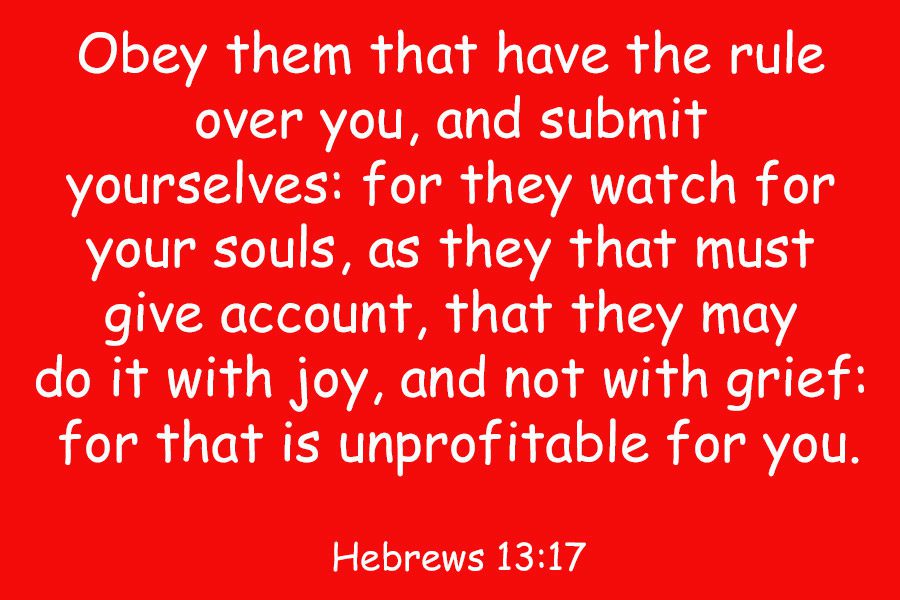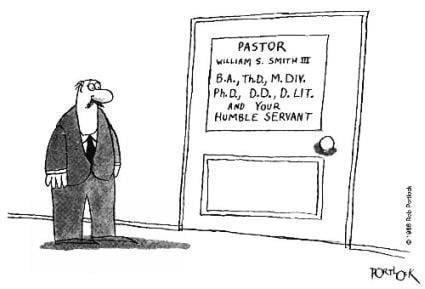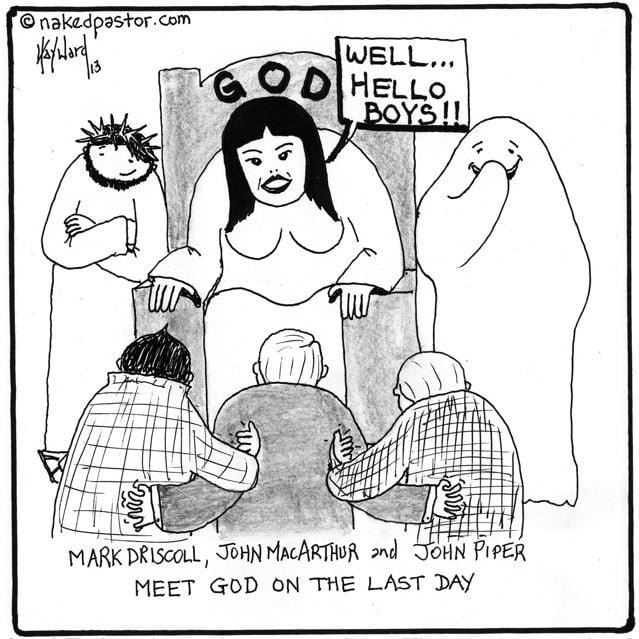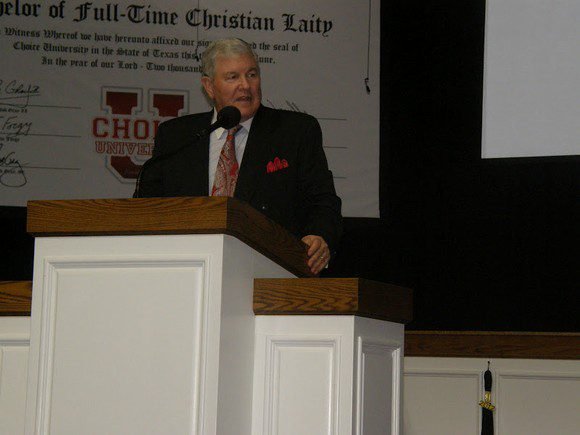
Allen Domelle, a graduate of Hyles-Anderson College, is the pastor of Maranatha Baptist Church in Bethany, Oklahoma. A staunch defender of the Independent Fundamentalist Baptist (IFB) church movement, Domelle is also the editor of the Old Paths Journal. Several years ago, Domelle published an article titled, Treatment of the Man of God (which is no longer available). Domelle offered four ways church members should never treat their pastors:
- Never treat the man of God with disdain
- Never demand of the man of God
- Never distance yourself from the man of God
- Never treat the man of God irreverently
In IFB churches, the pastor is called the “man of God.” While Domelle says “the man of God is nothing of himself,” he makes it clear that the man of God’s “position” is what makes him important. Most IFB congregations are pastored by one man. He is considered the head honcho, boss, and ruler. Jesus might get top billing, but IFB preachers are the star of the show, the hub around which the church turns. I know of one man who pastored his church for over forty years. He not only preached, but he also wrote the checks, kept the books, looked at the tithing records to see who was contributing, and ruled over every aspect of church life. When congregants were asked where they attended church, it was not uncommon for them to say, “I attend Pastor _______’s church.” This should not come as a surprise. In IFB churches, pastors often stay at one church for years. The longer the man stays at the church, the more autocratic control he has.
I attended Midwestern Baptist College in Pontiac, Michigan — an IFB institution. Pastors-in-training were encouraged to go to a community, start a church, and stay for a lifetime. Countless Midwestern graduates did just that. In fact, some men stay until they retire or die, often handing the church off to a son. The patriarchy lives on in IFB churches.
Millions of people attend churches on Sundays that are pastored and controlled by one man. When congregants look towards the man in the pulpit, they see a man above all men; God’s man; a man chosen by God to be their guide and ruler. (The phrase “man of God” is used seventy-two times in the King James Bible.) IFB preachers turn to the following verses (and others) to justify their authoritarian rule:
- Remember them which have the rule over you, who have spoken unto you the word of God: whose faith follow, considering the end of their conversation . . . Obey them that have the rule over you, and submit yourselves: for they watch for your souls, as they that must give account, that they may do it with joy, and not with grief: for that is unprofitable for you. (Hebrews 13:7,17)
- Let the elders that rule well be counted worthy of double honour, especially they who labour in the word and doctrine. (1 Timothy 5:17)
Some IFB churches have a plurality of elders (pastors). Supposedly, having multiple “men of God” stymies authoritarian rule. However, a closer examination of such churches reveals that while there may be more than one pastor, there’s one, and only one, head pastor. Fundamentalist John MacArthur pastors a megachurch in California. The church is governed by an elder board. But make no mistake about it, Grace Community Church is John MacArthur’s church. He alone has the final say. I have yet to see an Evangelical church that has an elder board that didn’t have one man who ruled the roost above all others.
In IFB circles, along with Evangelicalism in general, congregants revere their pastors. This should not shock anyone. When you are taught from an early age that the man in the pulpit is God’s messenger, that he is chosen, directed, and anointed by God, is it a surprise that church members idolize their pastor? As a student at Midwestern, I heard more than one chapel speaker say that a pastor becoming president of the United States would be a step down. I was taught that what America needed was more “men of God” called to preach the gospel and stand against Satan. I left college in 1979 believing that God had put his stamp of approval on my life; that this “calling” I had received from God was irrevocable. (The Bible says in Romans 11:29: For the gifts and calling of God are without repentance.)
Let me bring this rabbit trail back around to Domelle’s post. As is common among IFB preachers, Domelle yearns for the good old days — the 1950s. (Please see Pastor Bob Gray Sr. Pines for the 1950s) He pines for a day when “men of God were revered and honored. It wasn’t that those men were sinless, but it was the position they held that demanded the respect of every person, and was expected from every person.”
Let’s briefly look at Domelle’s four ways congregants should not treat the “man of God.”
Never treat the man of God with disdain
Just because the man of God preaches against your sins doesn’t make him a bad man. The disrespect of men of God on social media is atrocious. People feel like they can say hateful and disrespectful things to the man of God because they feel that they have the forum and the “right” to criticize him. Always remember that how you treat men of God is a revelation of your respect of God.
Domelle believes it is always wrong to criticize the “man of God.” How you treat the “man of God” reveals the level of respect you have for God. Disrespect your pastor, and you disrespect God. Is it any wonder IFB church members fear criticizing their pastor? Mess with the preacher, and you are messing with God.
Never demand of the man of God
To demand of the man of God is to put yourself in God’s place because it is God’s position to deal with the man of God. Sometimes it is not what you are saying that is wrong, but it is how you are saying it to the man of God that is wrong. Your tone towards God’s man does matter to God; you should always be respectful instead of demanding.
According to Domelle, congregants should never demand anything from their pastor. If congregants think the “man of God” is lacking in some way, it is up to God, not them, to straighten him out. Hear rumors that Pastor Billy is fucking his secretary? Take the matter to God and let him take care of it. Scandals are often shoved under the proverbial rug. If God wants things to be different, he will take care of the matter. Sadly, God rarely takes care of anything, resulting in the rug turning into a mountain of dirty laundry. Decades of misconduct are swept under the rug, with congregants believing that God will make things right. As the Black Collar Crime Series makes clear, if church members don’t act, no one will.
Domelle believes that congregants should always be respectful to their pastor, regardless of whether such respect is earned. The “man of God” deserves respect no matter what. Again, Domelle invokes God’s name when he says “your tone towards God’s man does matter to God.” Be careful, God is listening to how you talk to your pastor. Use a disrespectful tone and God just might chastise you.
Never distance yourself from the man of God
People who distance themselves from God’s man find themselves missing the heart of the man of God, and they also miss seeing the miracles of God up close. One of the biggest reasons I have found that people follow the man of God from afar is because they don’t want him to find out what they are doing.
In IFB churches, pastors are often considered God’s bloodhounds. Supposedly, they have a nose for sin — well a nose for every sin but their own. According to Domelle, people distance themselves from the “man of God” because they fear he will discover their sin. Wait a minute, Bruce, I thought people’s sins were between them and God. Maybe, but pastors of IFB churches are the equivalent of the Pope. They are Christ’s representatives on earth, given the duty and responsibility to suss out the sinful behavior of congregants.
The “man of God” oversees the lives of church members, both at church and at home. His eyes are ever watching for “sin.” What is “sin” you ask? Why, whatever the man of God says it is. His interpretation of the Bible is the standard by which all things are judged. Interpreting the Bible differently is viewed as rebellion against not only God, but against the “man of God.” One pastor I knew well told me, “how can a man of God rule over his church unless he rules over EVERYTHING?” His question reveals the fact that authoritarianism breeds absolutism. The pastor is absolutely right all the time. Why? Because he is the “man of God.” Is it any wonder that some people consider the IFB church movement a cult?
Never treat the man of God irreverently
In 2 Kings 2:23-25, some boys thought it was funny to call Elisha a bald man, but God showed that He would not tolerate irreverence towards His servant. Always treat the man of God with respect. Never call him by his first name, but always address him according to his position. Never talk bad about the man of God, because you place yourself against God when you choose to speak irreverently about His servant.
The proper way to treat God’s man is to have a reverential fear of him and follow him closely as he follows God. You should have a fear of God’s man, and you should treat him with dignity and respect; he is God’s man.
Virtually every article or sermon on pastoral authority will include 1 Chronicles 16:22: Touch not mine anointed, and do my prophets no harm and 2 Kings 2:23-25:
And he [Elisha] went up from thence unto Bethel: and as he was going up by the way, there came forth little children out of the city, and mocked him, and said unto him, Go up, thou bald head; go up, thou bald head. And he turned back, and looked on them, and cursed them in the name of the Lord. And there came forth two she bears out of the wood, and tare forty and two children of them. And he went from thence to mount Carmel, and from thence he returned to Samaria.
Simply put, don’t mess with the “man of God” lest bears kill you and eat your body for dinner. Longtime IFB church members have likely heard these verses many, many times. What better way to keep congregants in line than to warn them that God will kill them if they dare speak poorly of or oppose the “man of God.” Domelle states, “Never talk bad about the man of God, because you place yourself against God when you choose to speak irreverently about His servant.” In fact, according to Domelle, you shouldn’t even call the “man of God” by his first name! That’s right. Doing so is disrespectful. I have heard several IFB preachers say that they demand church members call them Pastor _________ (last name). Some of these preachers have Dr. in front of their names (please see IFB Doctorates: Doctor, Doctor, Doctor, Everyone’s a Doctor) and expect church members to address them as Dr. ____________ (last name). Never mind the fact that IFB doctorates are almost always honorary or earned through diploma mills. If the “man of God” has a doctorate, people are expected to reverently address him as such.
Domelle tells his readers that they should “fear” the “man of God.” Why? Bears. Woods. Dinner. No one should be astonished, then, that IFB church members fear their pastor. He is the “man of God” and is to be respected at all times. If God and his man are as tight as Domelle alleges, I’d be fearful too. When you believe the preacher has a direct line to God, it makes sense to keep your mouth shut and obey his edicts. Either that or run as fast as you can out the back door of the church never to return. If you are heaven-bent on going to church, there are kinder, gentler expressions of faith than those found in IFB churches. Don’t waste another moment being psychologically traumatized by a man who confuses his place in life with God’s. (Not that I believe in God, I don’t. But some readers of this post do, and my advice to them is to seek out a pastor who doesn’t have a God complex, and who will treat them with dignity and respect.)
Bruce Gerencser, 68, lives in rural Northwest Ohio with his wife of 47 years. He and his wife have six grown children and sixteen grandchildren. Bruce pastored Evangelical churches for twenty-five years in Ohio, Texas, and Michigan. Bruce left the ministry in 2005, and in 2008 he left Christianity. Bruce is now a humanist and an atheist.
Your comments are welcome and appreciated. All first-time comments are moderated. Please read the commenting rules before commenting.
You can email Bruce via the Contact Form.










